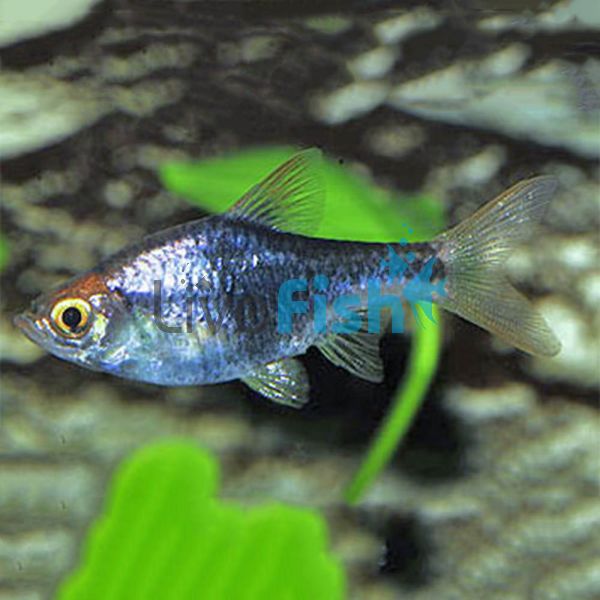Purple Harlequin Rasbora 3cm
As the ability to breed aquarium fish in captivity increases, it becomes easier to spot any oddball offspring that are produced. This could be Albino fish, long fin variants, and in some cases a totally unexpected colour variation. This is where the purple harlequin Rasbora comes in, since it is a unique genetic variation of the classic and loved red harlequin Rasbora. This new variant offers everything that aquarists look for in a community species with its schooling behaviour, small size, hardy nature, and special purple colour. The greatest thing though, its they have the exact same care requirements as normal harlequins because they are the same species.
Purple Harlequin Rasbora
As the ability to breed aquarium fish in captivity increases, it becomes easier to spot any oddball offspring that are produced. This could be Albino fish, long fin variants, and in some cases a totally unexpected colour variation. This is where the purple harlequin Rasbora comes in, since it is a unique genetic variation of the classic and loved red harlequin Rasbora. This new variant offers everything that aquarists look for in a community species with its schooling behaviour, small size, hardy nature, and special purple colour. The greatest thing though, its they have the exact same care requirements as normal harlequins because they are the same species.
These rasboras are a total contrast to their standard counterparts however, the colours on this fish are truly stunning. As their name suggests, the purple Rasbora has a very light, almost lavender colour throughout the body. They almost look translucent since a lot of their interior is quite visible and surprisingly metallic, which adds another flair to this fish. For some even further contrast, the head of the purple Rasboras is a bright gold colour that will really shimmer under proper aquarium lighting. Finally, this species still carries the classic black, lamb chop shape on the body to clearly indicate that this is a harlequin Rasbora.
Purple harlequin rasbora only reach a maximum of 4.5 cm, making them great additions for smaller aquariums. They are a great fish to add a lot of life to large community aquariums as they are a tight schooling fish. Breeding the purple harlequin rasbora is certainly possible, as these fish were captive bred themselves however it is not a common practice in the home aquarium. It is difficult to tell males from females, and they also require specific environmental queues for breeding as well. The wild location of the standard harlequin rasbora is parts of Indonesia and Malaysia.
Tank Recommendations for your Purple Harlequin Rasbora
The purple harlequin rasbora is a small-growing fish and is a perfect schooling fish option for aquariums as small as 60 litres. These fish are active and school really well, meaning a larger aquarium is always best, and keeping a school of 6 or more is ideal. They also look amazing against plants and will thrive in a well-planted aquarium along with other peaceful tank mates. The substrate is not a major concern for these fish as they are mostly mid-water fish however, they are 'soft water' fish, meaning anything which could increase PH should be avoided. These are also tropical fish that are best kept at 24-26 degrees.
Suitable Tank Buddies
Due to their extremely peaceful behaviour, purple harlequin rasbora are great to include in community aquariums. They can be kept with a wide range of tetras, gourami, and other common, smaller fish species.
Usually Compatible
It is perfectly fine to mix the purple harlequins with standards to really give a different dynamic of colours in the school. They can also be kept with neon tetras, danios, bristlenose plecos, black widow tetras, and other smaller community fish.
Sometimes Compatible
Potentially aggressive or larger showing species such as severum or angelfish, which may pester the rasbora.
Rarely Compatible
Aggressive species that may prey on the harlequin rasbora, such as larger predator fish.
Feeding your Purple Harlequin Rasbora
Harlequin rasboras, in general, are very easy to feed; they take to a wide range of aquarium foods such as flake, pellets, and frozen foods. Due to their small mouths, a small floating or slow-sinking food is best, with supplementation of frozen bloodworms or brine shrimp.
| Scientific Name | Trigonostigma heteromorpha |
|---|---|
| Care Level | Easy |
| Common Names | Purple Harlequin Rasbora, Purple harequin tetra, Purple porkchop Rasbora |
| Diet | Carnivore |
| Fish Family | Cyprinidae |
| Lifespan (years) | 8 |
| Max. Length (cm) | 4.5 |
| Min. Tank Volume (l) | 60 |
| Origin | Indonesia & Malaysia |
| Sociability | Peaceful |
| Venomous | No |
| Water Conditions | 24-26° C, pH 6.0-7.0 |
| Plant Safe | Yes |




